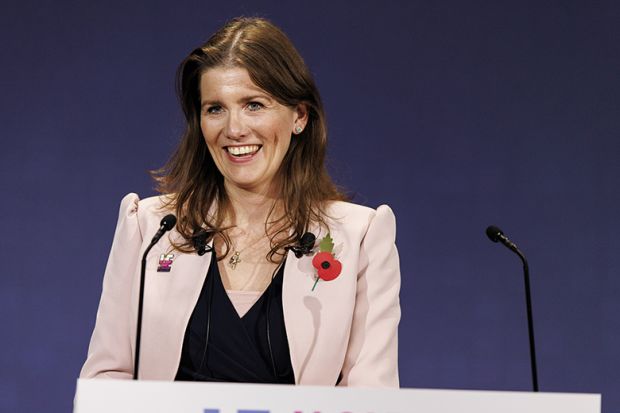The growing schism between UK Research and Innovation (UKRI) and the Westminster government over equality issues, highlighted by Michelle Donelan’s explosive letter about Israel, could cause major damage to UK science unless an understanding on research culture is reached, universities have been warned.
While the science secretary’s controversial letter to UKRI demanding the closure of an equality committee centred on what she called “the sharing of extremist views on social media” by panel members who “expressed sympathy” for Hamas, it also drew attention to “wider questions of UKRI’s approach to equality, diversity and inclusion”, arguing that it was adding “burden and bureaucracy to funding requirements”.
This is understood to refer to plans led by Research England to overhaul the next Research Excellence Framework (REF) by reducing the importance of outputs from 60 per cent to below 50 per cent while increasing the weighting of research culture in assessment to 25 per cent.
Those reforms have attracted criticism from some university leaders for their lack of precision, with UKRI widening its consultation after reporting that “informal discussions with the sector have identified the need for clearly defined indicators” on which culture will be assessed.
Clarifying how research culture will be examined in REF 2028 should be a priority for UKRI because this proposed change “has clearly become linked in Michelle Donelan’s mind to the so-called DEI [diversity, equality and inclusion] ‘complex’ that she doesn’t support”, said John Womersley, a former executive chair of the Science and Technology Facilities Council.
“Clarification of what ‘good research culture’ means will be useful if UKRI wants to answer her criticism,” he added.
“For a long time, UK research has enjoyed a period where more support for science has been acknowledged as a good thing by politicians. If we allow the science community to be viewed as virtue signallers more interested in woke ideology than excellence, then we risk losing that support.”
Researchers should not pin their hopes on Ms Donelan – who used a Conservative Party conference speech last month to attack “woke ideology” in science – leaving office in the event of a widely predicted Labour victory at the next general election, added Professor Womersley, a visiting professor of physics at the University of Oxford.
“Even if Michelle Donelan isn’t science secretary in a year’s time, she can do a lot of things that would affect science in the long term and could be difficult to undo,” he explained, suggesting that she could delay or even cancel the next REF “by executive fiat” if she felt that UKRI was significantly out of step with the Department for Science, Innovation and Technology on the design of the £2 billion-a-year funding allocation mechanism.
However, Glen O’Hara, professor of modern and contemporary history at Oxford Brookes University, said he believed Ms Donelan’s “ham-fisted” intervention on equality matters was likely to be “counterproductive” if she wanted to influence the future of the REF.
“Rather than work behind the scenes or write in a more emollient manner, she’s actually made it much harder for UKRI to soften much of its wider agenda, while dealing quite a big blow to the funding body’s popularity and credibility,” said Professor O’Hara.
Kieron Flanagan, professor of science and technology policy at the University of Manchester, said cancellation of the REF was highly unlikely because it existed only as a “political requirement to concentrate block funding”. Scrapping it “wouldn’t really fit with the signals we get from this particular axis that they believe funding should continue to be concentrated in a few places and teams”, he said.




